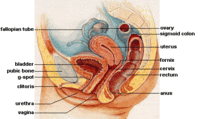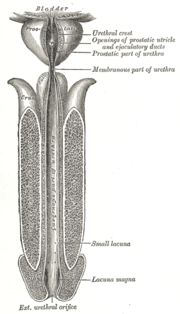Urethra
|
|
In anatomy, the urethra is a tube which connects the urinary bladder to the outside of the body. The urethra has an excretory function in both sexes, to pass urine to the outside, and also a reproductive function in the male, as a passage for sperm.
The external urethral sphincter is the skeletal muscle that allows voluntary control over urination.
| Contents |
Anatomy
Men have a longer urethra than women. This means that women tend to be more susceptible to infections of the bladder (cystitis) and the urinary tract. The length of a male's urethra, and the fact it contains a number of bends makes catheterisation more difficult.
In the human female, the urethra is about 1-1.5 inches (2.5-4 cm) long and opens in the vulva between the clitoris and the vaginal opening. In the human male, the urethra is about 8 inches (20 cm) long and opens at the end of the penis.
The urethra is divided into three parts in men, named after the location:
- The prostatic urethra crosses through the prostate gland. There is a small opening where the vas deferens enters.
- The membranous urethra is a small (1 or 2 cm) portion passing through the external urethral sphincter. This is the narrowest part of the urethra.
- The spongy (or penile) urethra runs along the length of the penis on its ventral (underneath) surface. It is about 15-16 cm in length, and travels through the corpus spongiosum.
Histology
The epithelium of the urethra starts off as transitional cells as it exits the bladder. Further along the urethra there are stratified columnar cells, then stratified squamous cells near the external meatus (exit hole).
There are small mucus-secreting urethral glands, that help protect the epithelium from the corrosive urine.
Medical problems of the urethra
- Hypospadias is a form of abnormal development of the urethra in the male, where the opening is not quite where it should be (it occurs lower than normal in hypospadias). A chordee is when the urethra develops between the penis and the scrotum.
- Infection of the urethra is urethritis, said to be more common in females than males. Urethritis is a common cause of dysuria (pain when urinating).
- Related to urethritis is so called urethral syndrome
- Passage of kidney stones through the urethra can be painful and subsequently it can lead to urethral strictures
Endoscopy of the bladder via the urethra is called cystoscopy.
Anatomy Clipart and Pictures
- Clip Art (https://classroomclipart.com)
- Anatomy Illustrations (https://classroomclipart.com/clipart/Illustrations/Anatomy.htm)
- Anatomy Clipart (https://classroomclipart.com/clipart/Anatomy.htm)
- Anatomy Animations (http://classroomclipart.com/cgi-bin/kids/imageFolio.cgi?direct=Animations/Anatomy)
Related topics
| Urinary system |
|
Kidneys - Ureters - Urinary bladder - Urethral sphincters - Urethra |
| Reproductive system |
| Female: Cervix - Clitoris - Clitoral hood - Fallopian tubes - Bartholin's glands - G-spot - Hymen - Mammary glands - Ovaries - Skene's glands - Urethra - Uterus - Vagina - Vulva |
| Male: Bulbourethral glands - Cowper's glands - Ejaculatory duct - Epididymis - Foreskin - Frenulum - Penis - Prostate - Scrotum - Seminal vesicles - Spermatic cord - Testes - Urethra - Vas deferens |




